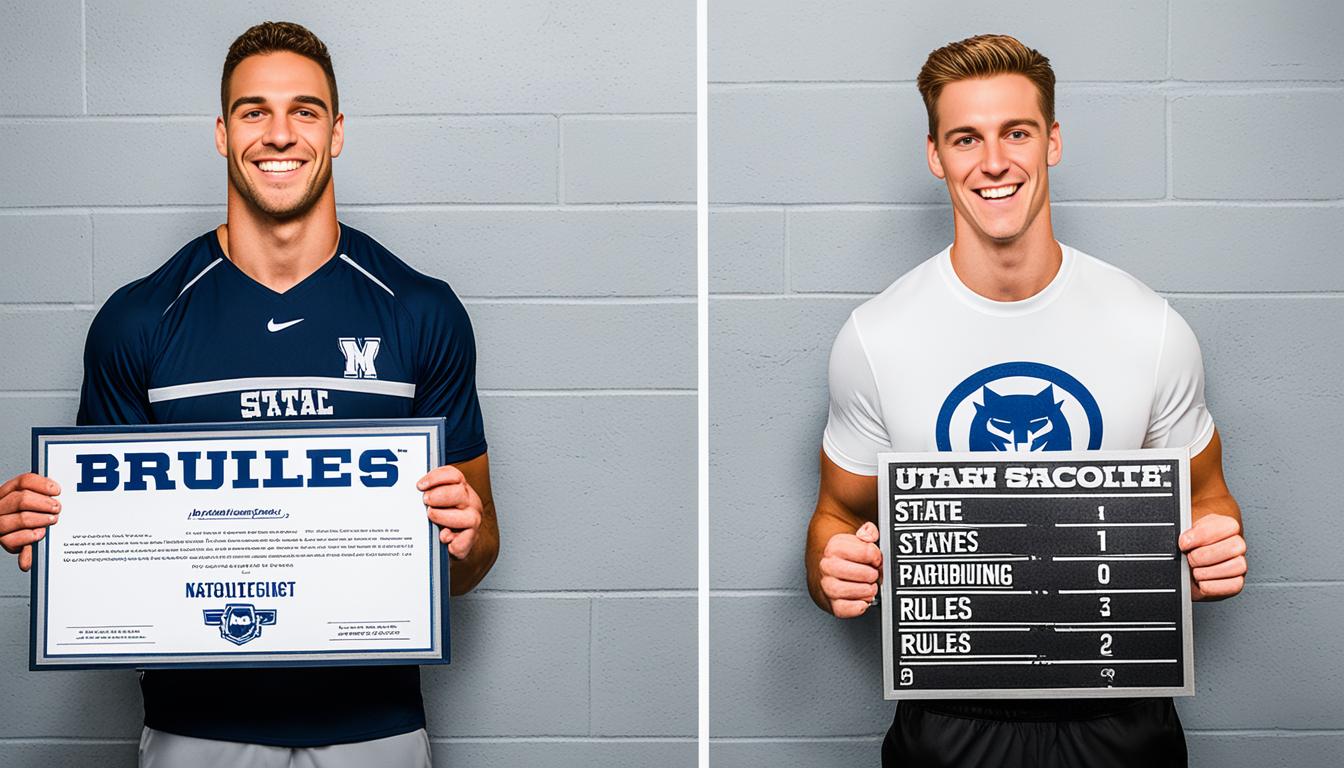Can High Schools Recruit Athletes? Rules & Ethics
Recruiting talented athletes is vital for high school sports programs looking to excel on the field or court. But is it ethical? Are there rules in place to govern the recruiting process? And what are the benefits, if any, of attracting athletes to high schools?
In this article, we will explore the world of high school athletic recruitment, uncovering the strategies used, the rules and regulations guiding the process, and the ethical considerations that athletes and coaches must navigate. So, can high schools recruit athletes? Let’s dive in and find out.
NCAA and State Athletic Association Rules on Recruiting
The NCAA and State Athletic Associations have implemented stringent rules and regulations to govern the recruitment of high school athletes. These rules are in place to ensure fair and ethical practices and maintain the integrity of collegiate sports.
Direct recruiting is subject to specific guidelines, which involve communication and contact between college coaches or representatives and high school athletes to recruit them to play for their college teams.
Under NCAA rules, college coaches are prohibited from contacting high school athletes before a designated “quiet period.” This period allows high school athletes to focus on their academic and athletic pursuits without undue influence from college recruiters.
State Athletic Associations align their regulations with the NCAA’s to maintain consistency and fairness throughout recruitment.
Violations of these recruiting rules can lead to severe consequences for the college or university involved and the coaches responsible. Penalties may include probationary periods, loss of scholarships, and even disqualification of teams from postseason play. The NCAA and State Athletic Associations take recruiting violations seriously and rigorously enforce compliance.
It is essential for coaches, prospective student-athletes, and athletic departments to fully familiarize themselves with these rules and regulations to ensure that recruitment practices remain ethical and abide by the established guidelines.
Table: NCAA and State Athletic Association Rules on Recruiting Violations and Penalties
| Violation | Penalty |
|---|---|
| Contacting high school athletes before the quiet period | Probation, loss of scholarships |
| Providing improper benefits to high school athletes | Probation, loss of scholarships, postseason bans |
| Coercing high school athletes into committing to a college team | Probation, loss of scholarships, postseason bans, recruiting restrictions |
How Coaches Still Influence Elite Athletes
Coaches play a crucial role in recruiting athletes despite the strict rules and regulations governing the process. They employ various strategies to attract top talent and build lasting relationships with athletes.
One effective method coaches utilize is hosting youth sports camps. These camps provide athletes with an opportunity to showcase their skills and allow coaches to evaluate potential recruits firsthand. By observing athletes in action, coaches can assess their abilities and potential fit within their programs.
🌟 Hey Students! 🚀 Ready for the ultimate experience? Join us on Studentsinside.com's Facebook, YouTube, WhatsApp, and LinkedIn. Click now for tips, fun, and success vibes! 🌈✨ #StudentLife #JoinUs
Another significant way coaches influence elite athletes is by building early relationships. These relationships often extend beyond the playing field into high school and college. Building these bonds early on increases the likelihood that athletes will choose to play for a coach with whom they have a strong relationship.
In addition to their coaching responsibilities, coaches may suggest academic programs and support services to potential recruits. This comprehensive approach appeals to athletes who prioritize their education and seek programs that prioritize their long-term growth and success.
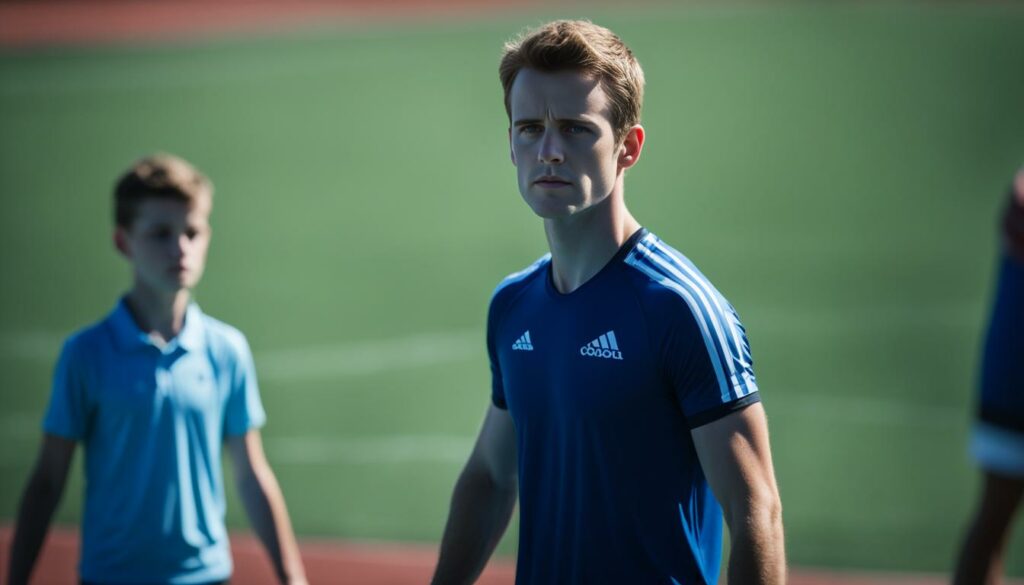
We can see the impact of coaching influence on elite athletes through various success stories in the sports world. An example is basketball coach Mike Krzyzewski’s relationship with renowned player LeBron James.
Coach K, as he is commonly known, recognized James’ exceptional talent at a young age and built a strong connection with him. This early relationship ultimately led to LeBron James’ decision to play for Coach K’s Duke University before making an impactful transition to the NBA.
Arguments For and Against Recruiting Restrictions
In the realm of high school sports, recruiting restrictions elicit contrasting viewpoints. Advocates argue that such limitations foster fairness, level the playing field, and prevent schools with greater resources from easily recruiting top-tier athletes, thereby preventing uneven competition.
Conversely, detractors maintain that these restrictions can impede the development of exceptional athletes, constraining their prospects for scholarships and further advancement.
Moreover, recruiting restrictions raise questions about school choice for student-athletes; some argue that these limitations restrict their ability to select the best high school that caters to their athletic and academic needs, whereas others contend that these restrictions safeguard them from being solely pressured based on their athletic abilities.
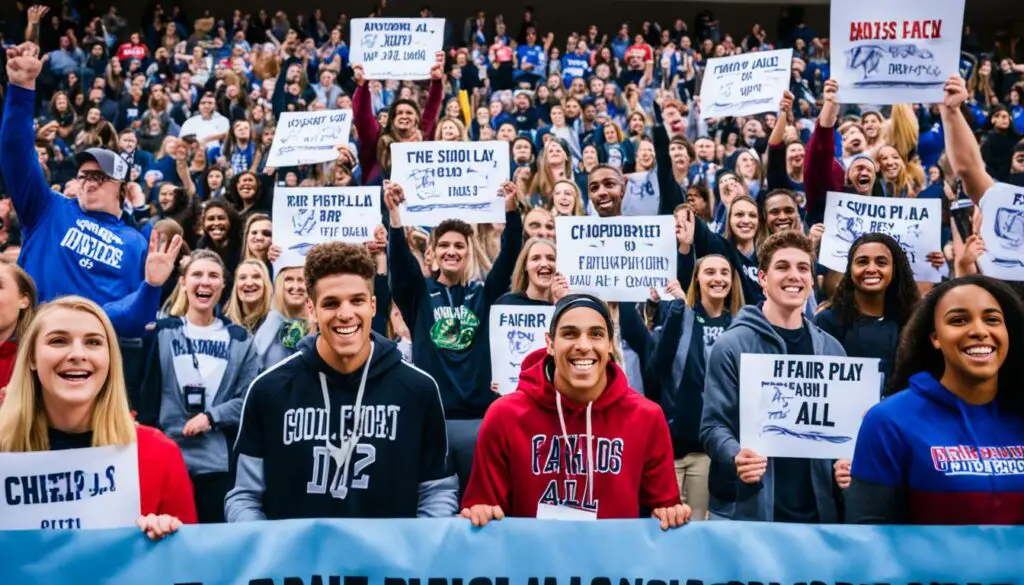
Tips for Navigating Recruiting and Transfers
To successfully navigate the recruiting and transfer process, it is crucial to understand the rules and regulations in place clearly. Each sport and athletic association may have different guidelines, so it’s essential to familiarize yourself with the specific recruiting rules that apply to your situation.
When approaching the recruiting process, it’s essential to focus on finding the right fit for the athlete and the school. Instead of solely prioritizing recruiting, consider factors such as academic programs and support services offered by the school.
Coaches should be transparent about students’ chances of gaining entrance and provide statistical evidence of past success and program expectations.
Avoid putting undue pressure on prospective student-athletes to commit or decide if they are not ready. Giving them the time and space to make an informed choice that aligns with their goals and aspirations is essential.
Key Tips for Navigating Recruiting and Transfers:
- Understand the specific recruiting rules and regulations for your sport and athletic association.
- Focus on finding the right fit for the athlete and the school, considering academic programs and support services.
- Be transparent about a student’s chances of gaining entrance and provide statistical evidence of past success and program expectations.
- Avoid applying pressure on prospective student-athletes to commit or make a decision if they are not ready.
- Comply with all rules and regulations to avoid potential violations and their consequences.
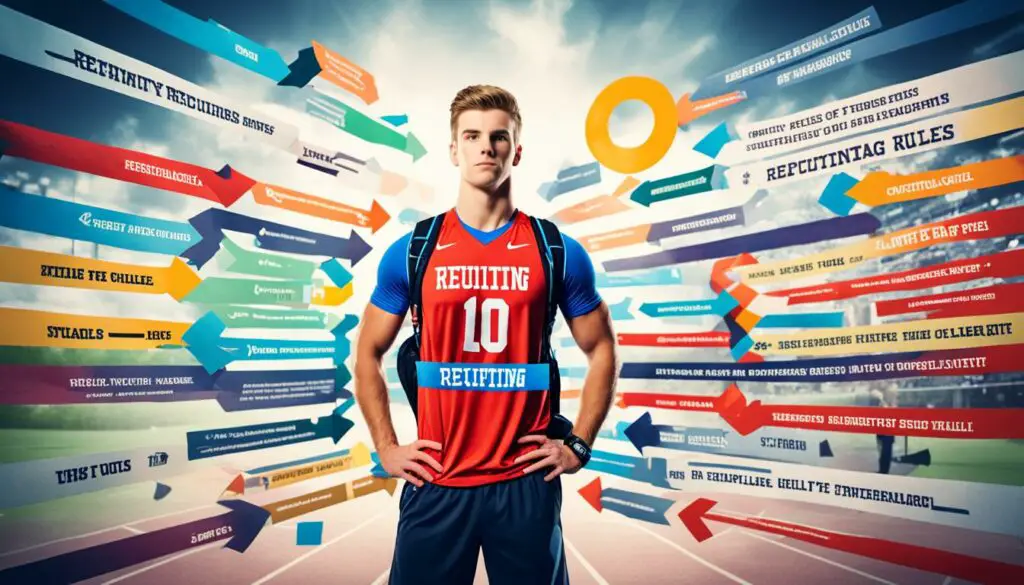
Encouraging Self-Regulation in High School Athletics
To address the issue of illegal recruiting and transfers, some states are embracing the concept of self-regulation in high school athletics. This approach involves high schools taking responsibility for investigating and resolving infractions independently.
Ethical conduct by coaches is of utmost importance, as it ensures the institution’s integrity and creates a level playing field for all athletes. While self-regulation empowers high schools to handle infractions internally, it is worth noting that state athletic associations can still levy sanctions on programs associated with violations. These sanctions may include probation or bans from postseason play.
Schools and coaches must be fully aware of the potential consequences of unethical behavior. Violations can result in severe penalties, including termination of employment and damage to the school’s image.
To illustrate the significance of self-regulation in high school athletics, consider the following table:
| Consequences | Explanation |
|---|---|
| Probation | Temporary suspension of a program’s eligibility for postseason play |
| Ban from Postseason Play | Prohibition from participating in tournaments, championships, or playoffs |
| Termination of Employment | Dismissal of coaches involved in unethical recruiting practices |
| Damage to the School’s Image | Deterioration of the school’s reputation due to unethical conduct |
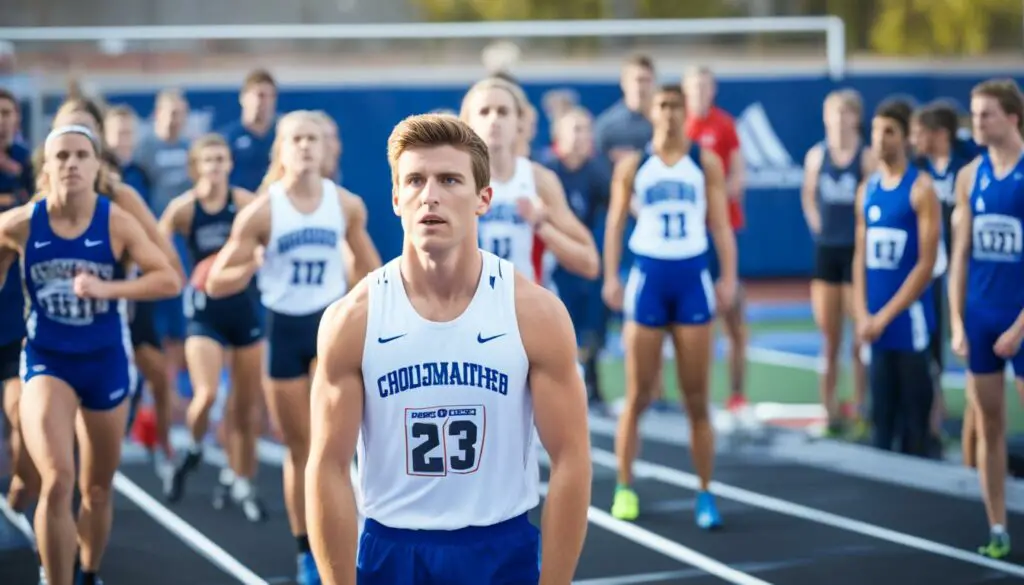
Education and Clarification of Rules
Effective education and clarifying the rules are essential in addressing recruiting violations and unethical behavior in high school athletics.
To maintain a level playing field and uphold the integrity of the sport, coaches must be well-informed about the rules and regulations governing athletic recruitment. Coaches must clearly understand what is expected of them and the consequences of violating these rules.
Collaborative relationships between coaches and admissions office personnel are crucial in ensuring compliance and ethical practices. Transparency and honesty in coaches’ interactions with potential recruits are vital, as they help build trust and ensure that athletes make informed decisions about their future.
Clarity and transparency regarding the rules are also essential in reducing confusion and preventing unintentional violations. Governing bodies and athletic associations should strive to provide clear guidelines and explanations to coaches, athletes, and other stakeholders.
Enforcement of the rules by governing bodies is crucial to deter unethical behavior and maintain a fair recruiting environment. Violations should be promptly reported, thoroughly investigated, and appropriately punished.
Coaches and athletic programs must understand that violations can have severe consequences, including probation, loss of scholarships, and even disqualification from postseason play.
FAQ
Q: Can high schools directly recruit athletes?
A: No, high schools are typically prohibited from directly recruiting middle school athletes. However, coaches can promote their programs, host camps, and build relationships encouraging elite athletes to enroll.
Q: What are the rules on direct recruiting set by the NCAA and State Athletic Associations?
A: The NCAA and State Athletic Associations have strict rules for direct recruiting. Coaches are prohibited from contacting high school athletes before a specific date, known as the “quiet period.” Violations can result in severe penalties for the college or university and the responsible coaches.
Q: How do coaches influence elite athletes?
A: Coaches play a crucial role in recruiting elite athletes. They often host youth sports camps where athletes can showcase their skills. Building early relationships with athletes is also essential, increasing trust and loyalty. Coaches may suggest academic programs and support services, highlighting athletic and academic development.
Q: What are the arguments for and against recruiting restrictions in high school sports?
A: Those favoring restrictions believe they promote fairness and prevent uneven competition. However, others argue that restrictions limit exceptional athletes’ development and scholarship opportunities. Recruiting restrictions also raise questions about student-athletes’ school choice.
Q: How can athletes navigate the recruiting and transfer process?
A: Athletes should understand the rules and regulations. Focusing on finding the right fit for the athlete and the school is crucial. Coaches should familiarize themselves with academic programs and be transparent about the student’s chance of gaining entrance. Compliance with all rules and regulations is necessary to avoid violations.
Q: How can self-regulation address illegal recruiting and transfers in high school athletics?
A: Some states encourage self-regulation in high school athletics, where schools are responsible for investigating and resolving infractions. By cracking down on unethical behavior among coaches, schools can prevent sanctions and protect the reputation of their athletic programs.
Q: How can education and clarification of rules address recruiting violations and unethical behavior?
A: Coaches should be well-informed about the rules and regulations and clearly understand what is expected. Collaborative relationships between coaches and admissions office personnel are essential, and coaches should be transparent and honest in their interactions with recruits. Education and enforcement by governing bodies can help reduce unethical behavior and ensure a level playing field.

